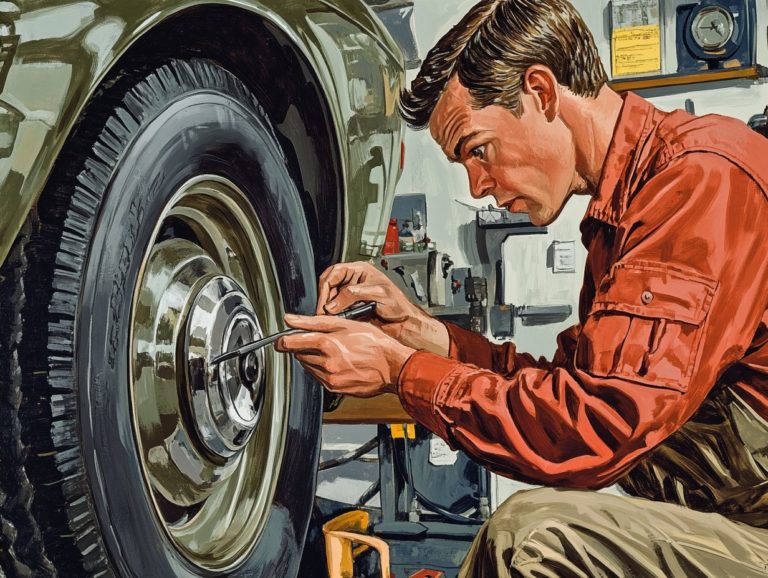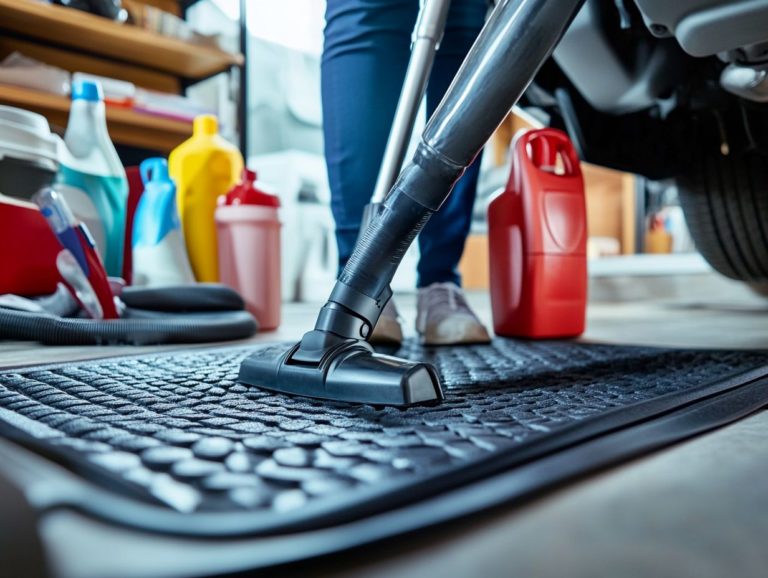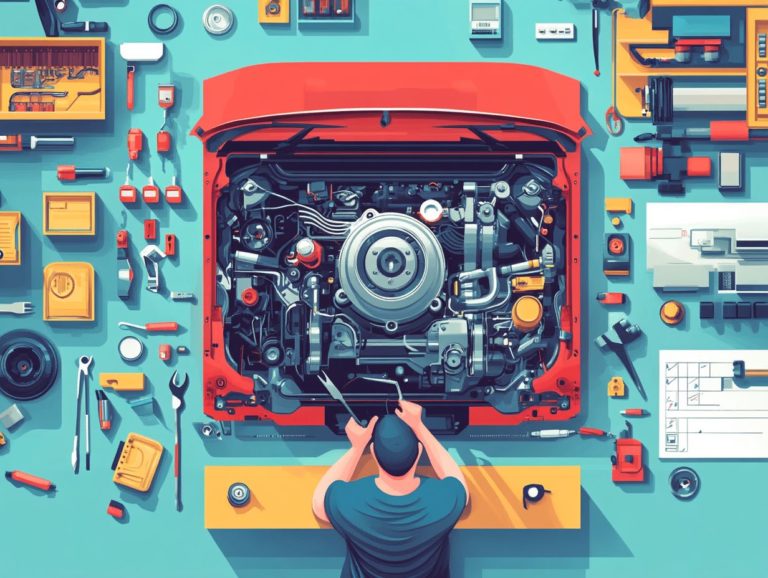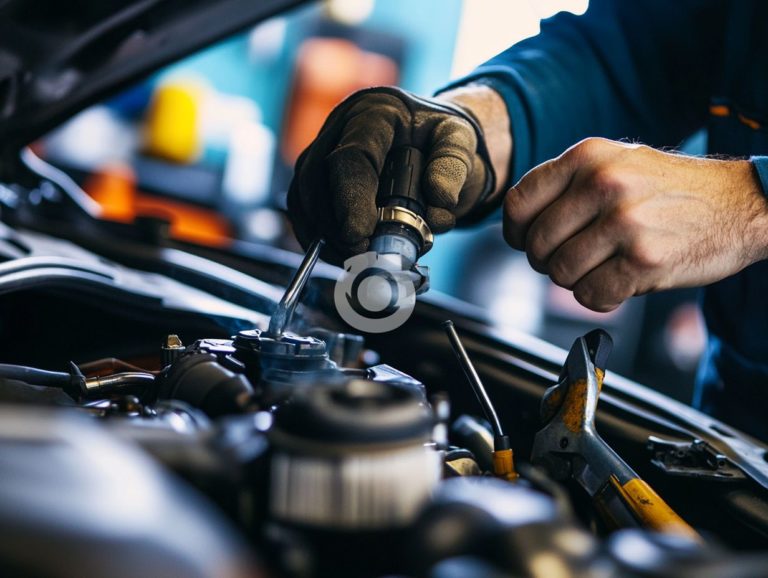How to Maintain Your Car’s Fuel Efficiency
Fuel efficiency is crucial for your wallet and the planet. Understanding how to enhance it can save you money and make a real difference.
Grasping what contributes to fuel efficiency like your driving habits, vehicle maintenance, and outside conditions empowers you to make informed decisions.
Let s explore some practical tips that will help you enhance your vehicle’s efficiency, dispel common myths, and underscore the advantages of managing fuel consumption.
Whether you’re an experienced driver or just starting out, you’ll discover valuable insights that enable you to maximize every gallon.
Contents
- Key Takeaways:
- What is Fuel Efficiency?
- Factors Affecting Fuel Efficiency
- Tips for Maintaining Fuel Efficiency
- Common Myths About Fuel Efficiency
- Frequently Asked Questions
- 1. What are some simple ways to maintain my car’s fuel efficiency?
- 2. How does keeping my tires properly inflated help with fuel efficiency?
- 3. How often should I change my air filters to maintain fuel efficiency?
- 4. Does aggressive driving affect fuel efficiency?
- 5. How can I keep my car’s engine well-maintained for optimal fuel efficiency?
- 6. Is it necessary to use premium fuel for my car’s fuel efficiency?
Key Takeaways:

- Stay on top of maintenance to boost your fuel efficiency. Proper tire inflation, regular oil changes, and efficient driving techniques all play a role in keeping your car’s fuel efficiency high.
- Outside conditions such as weather and road conditions can impact fuel efficiency. Plan your route and avoid extreme temperatures to save on gas.
- Don’t fall for common myths about fuel efficiency. Debunk misconceptions and reap the benefits of maintaining fuel efficiency, including saving money and reducing your carbon footprint.
What is Fuel Efficiency?
Fuel efficiency is your vehicle s ability to stretch every drop of fuel, typically measured in miles per gallon (MPG). Understanding the details of fuel economy is crucial for anyone looking to cut down on fuel expenses and minimize their carbon footprint. It s also key for those who want to enhance their vehicle s performance.
According to the Department of Energy, several factors affect fuel efficiency. These include your driving habits, routine vehicle maintenance, and external conditions.
Factors Affecting Fuel Efficiency
Fuel efficiency is influenced by a variety of factors, including your driving habits and the maintenance of your vehicle, as well as external conditions that can affect performance and gas mileage. By grasping how these elements interact, you can optimize your fuel economy and minimize costs linked to excessive idling and aggressive driving.
You can improve fuel efficiency by making simple changes to your driving behavior such as sticking to speed limits and avoiding unnecessary weight alongside diligent maintenance practices like checking tire pressure and replacing dirty air filters. These actions can greatly improve your vehicle s efficiency.
Driving Habits
Driving habits significantly influence your vehicle’s fuel economy. Practices like aggressive driving and excessive idling can lead to substantial fuel wastage and diminished gas mileage. By observing speed limits and effectively using cruise control, you can maintain an optimal speed that enhances fuel efficiency. It s essential to grasp how various driving behaviors affect fuel consumption if you aim to elevate your vehicle’s performance and reduce emissions.
To further optimize your fuel economy, adopting smooth acceleration techniques is key. Instead of racing from stoplights, gently pressing the accelerator can dramatically lower your fuel consumption. Minimizing rapid stops not only boosts safety but also conserves energy; coasting to a stop rather than abruptly hitting the brakes can make a notable difference.
Whenever you can, utilize cruise control on the highway to elevate fuel efficiency by maintaining a steady speed, which in turn reduces the engine’s workload. By weaving these practical driving tips into your routine, you can make a meaningful impact on your vehicle’s performance and fuel savings.
Vehicle Maintenance
Proper vehicle maintenance is essential for ensuring optimal fuel efficiency. Neglecting key components can lead to decreased gas mileage and elevated emissions. To learn how to measure fuel efficiency accurately, check your tire pressure, replace dirty air filters, and monitor the oxygen sensor. These steps will significantly boost your vehicle’s performance.
Choosing the right type of motor oil is equally important; it contributes to improved engine efficiency and better fuel economy.
Routine inspections are your best friend in identifying potential issues before they escalate, ultimately saving you both time and money. Don t overlook wheel alignment and brake health; they can save you money on fuel! Misaligned wheels create unnecessary drag, while worn brakes require more power, negatively impacting fuel efficiency.
By incorporating these specific maintenance tasks into your regular vehicle care routine, you can ensure a smoother ride and a healthier engine that operates at peak efficiency. This leads to reduced fuel consumption and fewer trips to the pump, making your driving experience both enjoyable and economical.
External Factors
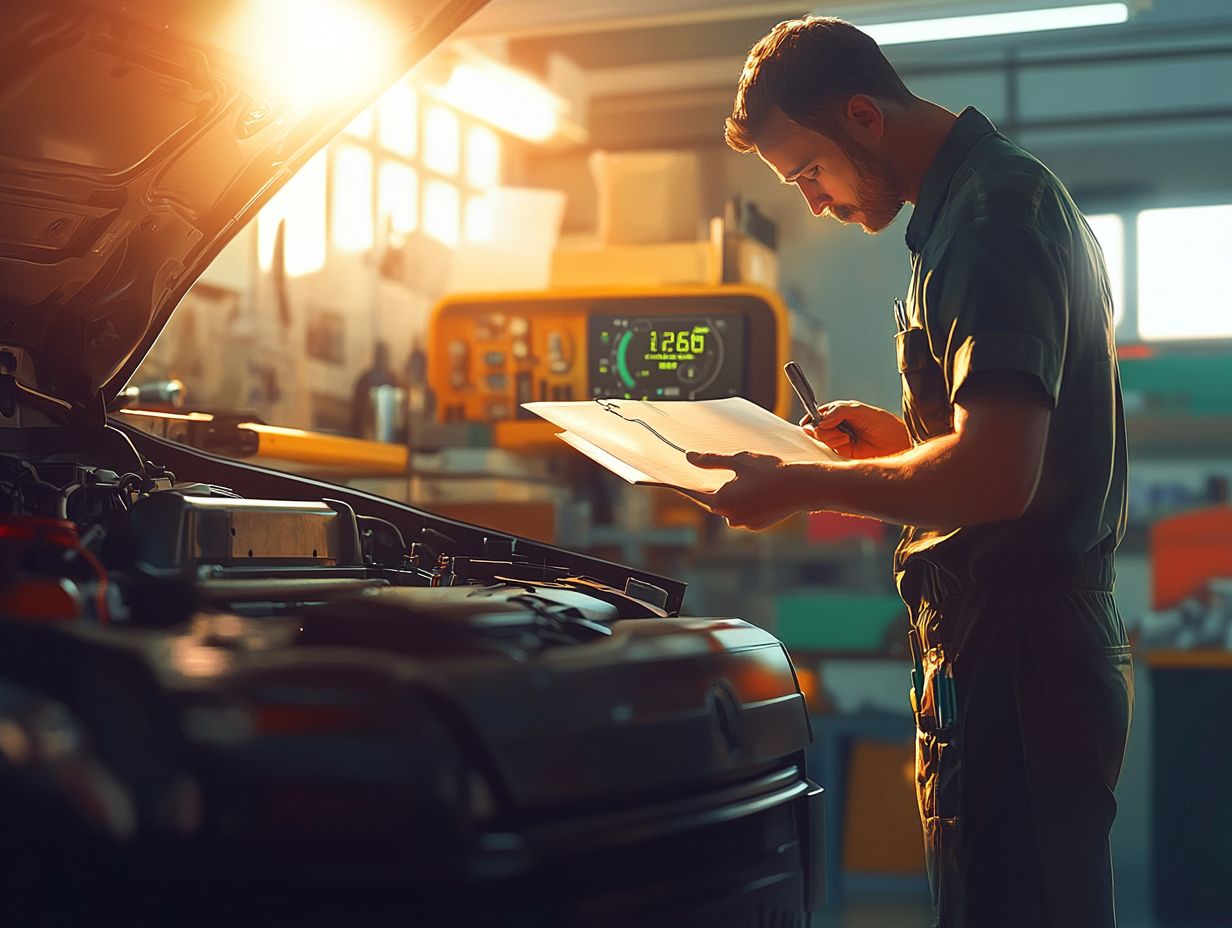
External factors like driving conditions, weather, and vehicle weight can greatly influence your fuel efficiency, affecting how far your car can travel on a tank of gas and how effectively it utilizes fuel. For instance, navigating hilly terrain or getting stuck in heavy traffic can lead to increased fuel consumption. Strategies like reducing weight can enhance your vehicle’s fuel economy. By understanding these external influences, you can adapt your driving strategies for improved fuel performance.
Adverse weather conditions such as strong winds, rain, or snow create resistance, forcing your engine to work harder and consume more fuel. To counteract these effects, maintain a steady speed and utilize cruise control when appropriate to help optimize your fuel usage.
Routine vehicle maintenance, like timely oil changes and tire pressure checks, prevents energy waste. By being mindful of these conditions and implementing actionable strategies, such as maintaining a car with high mileage, you can significantly enhance your vehicle’s efficiency, ultimately reducing your costs at the pump while minimizing your environmental footprint.
Tips for Maintaining Fuel Efficiency
Maintaining optimal fuel efficiency demands your consistent effort and keen attention to detail, especially when considering how to maintain your car’s fuel system, as it emphasizes both your driving habits and maintenance practices.
Incorporate simple practices like regularly checking tire pressure and ensuring timely oil changes. This can lead to notable improvements in gas mileage.
Utilize fuel additives and be mindful of your driving techniques for further enhancement of fuel economy. It’s essential for every discerning driver to embrace these practices for enduring benefits.
Proper Tire Inflation
Proper tire inflation is a crucial aspect of vehicle maintenance that directly impacts your fuel efficiency. Under-inflated tires increase rolling resistance, making it harder for your car to move and resulting in lower gas mileage. By regularly checking your tire pressure, you ensure that your tires are inflated to the manufacturer s recommended levels, significantly enhancing fuel economy and overall vehicle performance. This simple yet vital practice not only saves you money at the pump but also improves your road safety.
To maintain optimal tire pressure, check your tires at least once a month and before embarking on long trips, using a reliable tire gauge. Remember, temperature plays a role, as tire pressure can fluctuate with changing weather conditions. If you find the pressure is too low, inflate your tires at most gas stations or with a portable air compressor.
Just remember that over-inflation can also pose risks, so adjust your tires to the recommended specifications. This contributes to a smoother ride and extends the lifespan of both your tires and your vehicle.
Set a reminder on your phone to check your tire pressure monthly!
Regular Oil Changes
Regular oil changes are crucial for ensuring your engine performs at its best and enhancing fuel efficiency. Fresh motor oil reduces friction, allowing your engine to operate smoothly.
Neglecting this simple but important task can lower your fuel economy and even damage your engine. It s imperative to stick to your vehicle’s recommended service intervals. By prioritizing oil changes, you not only save on fuel costs but also extend the lifespan of your vehicle.
Among the various types of motor oils available, synthetic and conventional oils each offer distinct benefits for maintaining engine health. Synthetic oils are man-made oils designed for high performance and deliver superior stability at extreme temperatures, which can notably enhance fuel economy. When you choose high-quality oils, you might notice improved engine performance and a smoother ride.
Regular oil changes prevent the build-up of sludge and contaminants, ensuring that every component of your engine functions efficiently. Embracing this straightforward maintenance routine can lead to long-term savings, making it a savvy choice for any conscientious vehicle owner.
Efficient Driving Techniques
Employing efficient driving techniques is crucial for enhancing your fuel economy and reducing waste. Habits like maintaining a steady speed and using cruise control can significantly boost your gas mileage.
Adhering to speed limits keeps you safe and optimizes fuel consumption, making it a vital aspect of effective driving. Understanding how your driving behavior impacts fuel efficiency enables you to make smarter choices on the road.
Planning your routes in advance can greatly enhance your overall efficiency by minimizing unnecessary idling and detours. Utilizing navigation apps allows you to find the quickest paths, avoiding traffic congestion and saving you both time and fuel.
Incorporating gradual acceleration and deceleration into your driving habits enhances fuel savings. By paying close attention to these essential practices, you can extend the lifespan of your vehicle and lessen your environmental footprint, contributing positively to sustainable driving efforts.
Common Myths About Fuel Efficiency

Numerous myths surround fuel efficiency that can mislead you, affecting your vehicle’s performance and creating misconceptions about what influences gas mileage. For instance, the idea that premium fuel is always better or that aggressive driving saves time and fuel can lead you astray.
It s crucial to know the truth to boost your fuel economy. By understanding these myths, you empower yourself to make informed decisions that will genuinely benefit your vehicle’s fuel efficiency.
Debunking Misconceptions
Debunking misconceptions about fuel efficiency is essential for drivers aiming to optimize their vehicle’s performance and gas mileage. Many commonly held beliefs can lead to poor fuel economy.
For example, the notion that aggressive driving saves time or that consistently using premium fuel boosts performance is misleading and can waste fuel while increasing costs. Research from the U.S. Department of Energy shows that rapid acceleration and hard braking can decrease fuel efficiency by as much as 33% on highways.
Experts from Consumer Reports say that most vehicles run efficiently on regular unleaded fuel. This means that frequently opting for high-octane gas often yields no real benefits.
By clarifying these misconceptions, you can make smarter choices that enhance your fuel efficiency and ultimately save you money at the pump.
Benefits of Maintaining Fuel Efficiency
Maintaining fuel efficiency offers numerous benefits that go well beyond just saving money at the pump. By adopting practices that enhance your vehicle’s fuel economy, you can significantly reduce your impact on the environment.
This not only leads to lower fuel expenses but also contributes to a healthier planet for future generations. Moreover, using fuel efficiently results in fewer harmful gases from cars, leading to cleaner air and healthier communities.
Embracing efficient fuel consumption often means reduced wear and tear on your engine. This translates to fewer repairs and a longer lifespan for your vehicle.
It’s truly a win-win scenario! By being mindful of fuel efficiency, you save money while playing a vital role in creating a more sustainable environment.
Focusing on fuel efficiency resonates deeply, inspiring a sense of responsibility and community engagement as you adopt eco-friendly practices. Act now to save money and help the planet!
Frequently Asked Questions
1. What are some simple ways to maintain my car’s fuel efficiency?
There are several simple steps you can take. These include keeping your tires properly inflated, regularly changing your air filters, avoiding aggressive driving, and ensuring your car’s engine is well-maintained.
2. How does keeping my tires properly inflated help with fuel efficiency?

When your tires are underinflated, your car has to work harder to move. This can reduce fuel efficiency and increase your fuel costs.
3. How often should I change my air filters to maintain fuel efficiency?
It is recommended to change your car’s air filters every 12,000 miles or 12 months, whichever comes first. This helps improve airflow to your engine, leading to better fuel efficiency.
4. Does aggressive driving affect fuel efficiency?
Yes, aggressive driving like sudden acceleration and braking can significantly reduce your car’s fuel efficiency. It s best to drive at a steady pace to conserve fuel.
5. How can I keep my car’s engine well-maintained for optimal fuel efficiency?
Regular maintenance, such as oil changes and tune-ups, helps keep your engine running efficiently. Additionally, always use the recommended type of motor oil for your car.
Unless your car’s manufacturer specifically recommends it, premium fuel may not significantly impact fuel efficiency. Using the type of fuel recommended for your car helps avoid unnecessary costs.
Implementing these tips can make a real difference in your fuel efficiency. Start improving your fuel efficiency today!


